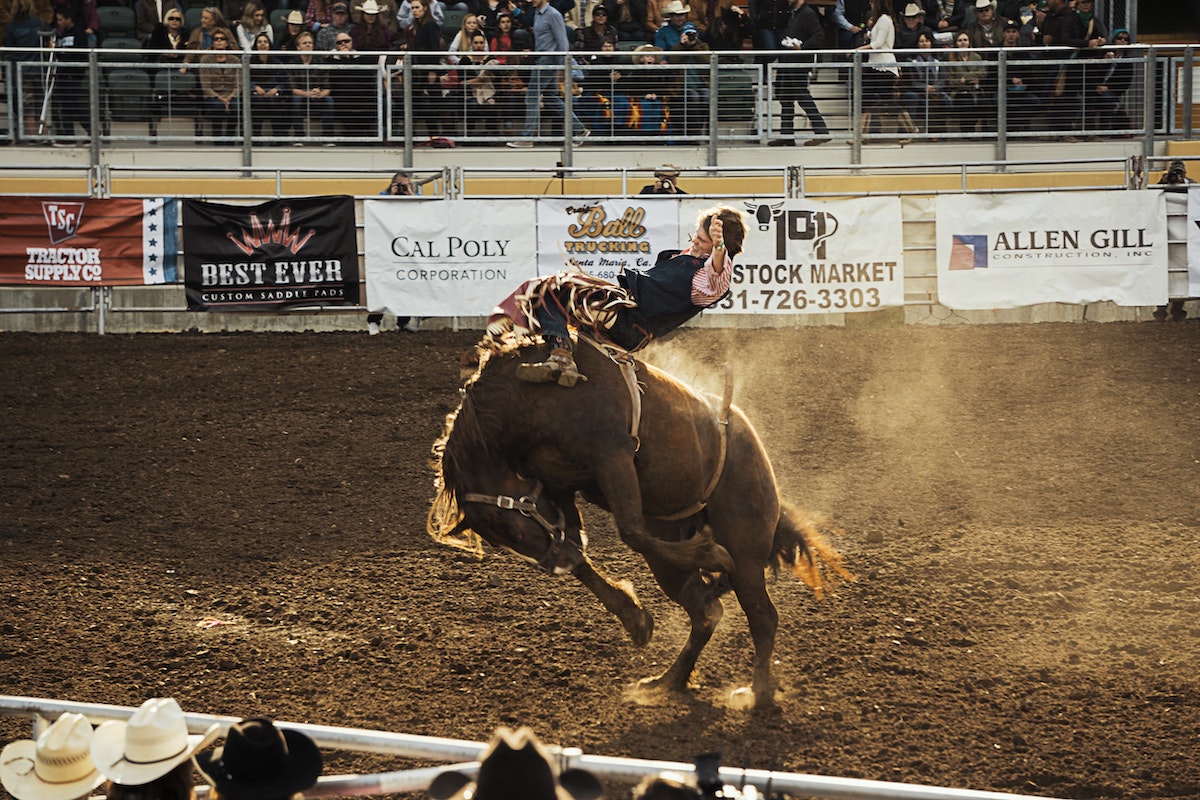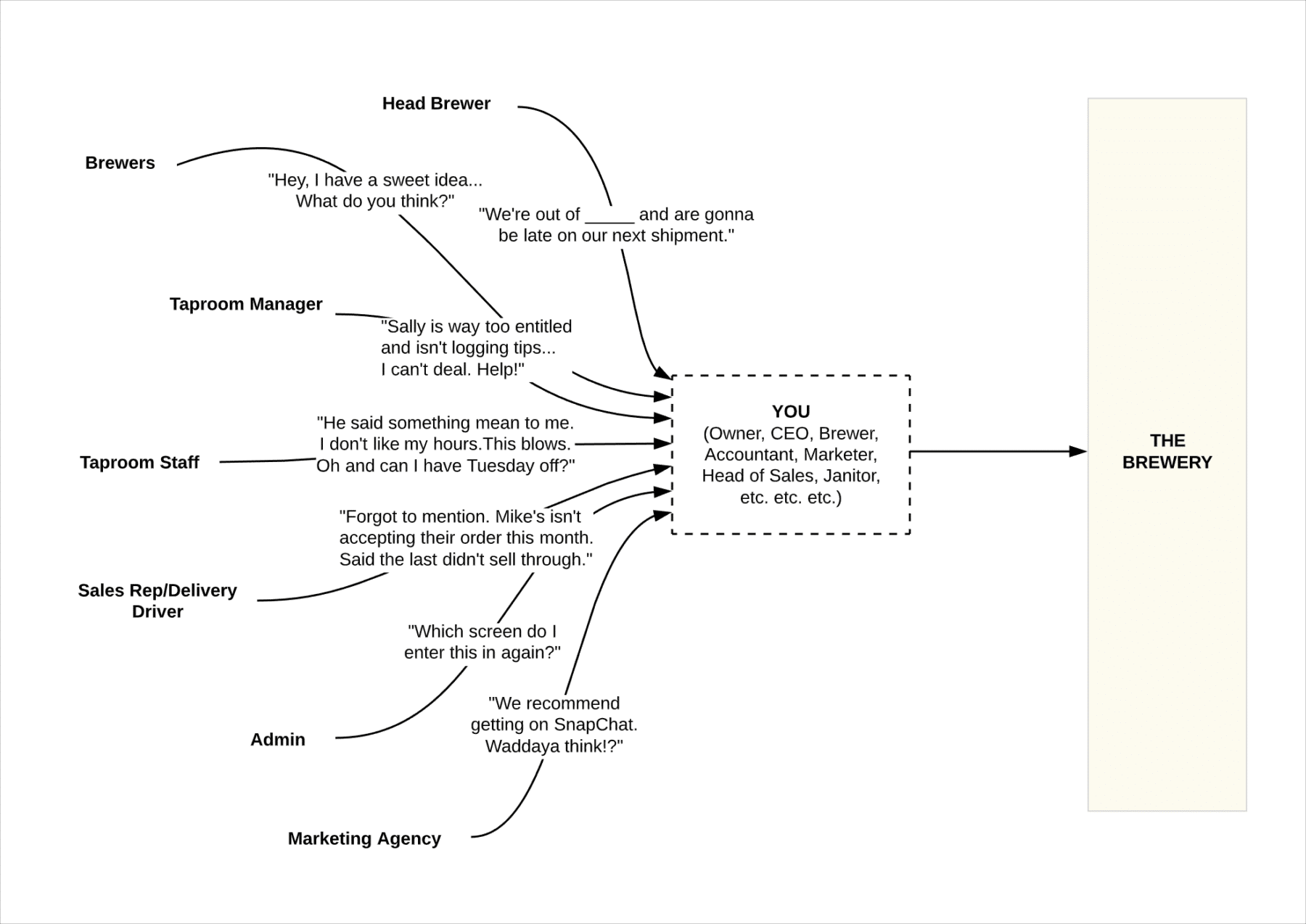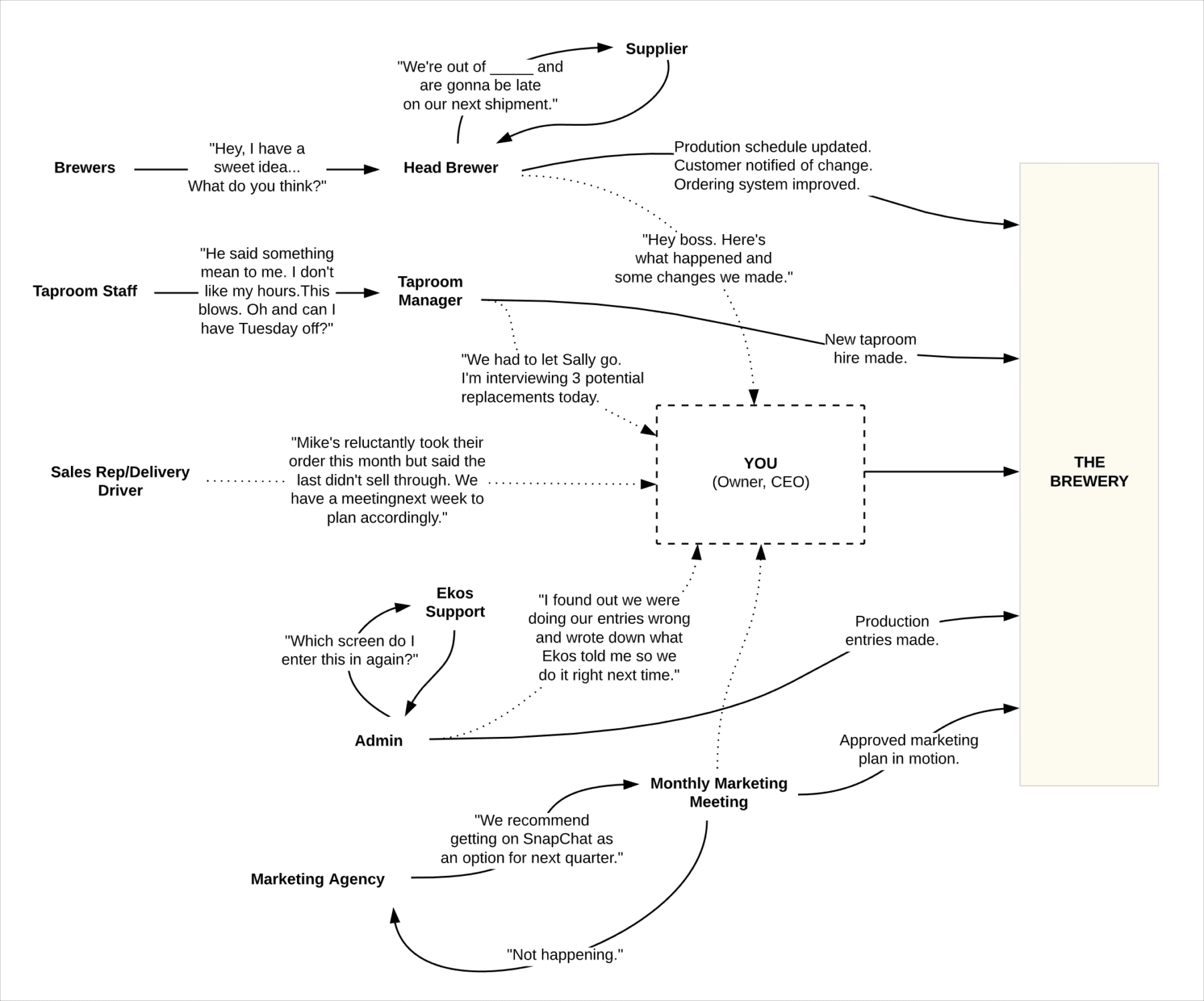Hi. My name is Chris, and I am addicted to control.
I have worked 60 hours a week, year after year, to build my dream company.
I love my work…
But secretly resent it.
I put all of the responsibility on my shoulders.
I am exhausted, but get up every day to do it again.
Sound familiar?
If this describes your experience and feelings toward your brewery…
Believe me, you are not alone!
So here in Part 1 of the Ownership Bottleneck Series, we’ll tackle the first step in relinquishing control and unlocking the potential of your brewery as a result: delegation.
The Illusion of Control
All entrepreneurs spend countless hours building something they love. But there comes a point where success breeds complexity, and the focus becomes foggy.
And when you hit this point, throwing more passion and energy for the craft on the pile just doesn’t move the needle like it used to. Something is different.
Think of it like this:
Early on, running your business was like riding an untamed pony… difficult to wrangle with a bit of a mind of its own, but ultimately easy to maintain control as long as you applied enough muscle when needed to straighten it back onto the right path.

Now, that pony has grown into a wild bull (I know… didn’t know ponies could grow up into bulls did you?). Big, powerful, and uncontrollable when things go haywire.
Some of the time when you try the old “muscle the reins” trick, it complies. But not for long, because when it wants to, it decides to buck twice as hard just out of spite. You desperately want to regain control, but are ultimately at the reactionary whims of the business.
Soon thereafter, you may even find yourself on top of a massive elephant with a mind of its own… you at the helm, struggling helplessly to redirect the momentum. You’re latching on to the feeling of control, but really you’re just along for the ride.
This is what I mean by The Illusion of Control.
The idea that tightening down the bolts harder, gritting your teeth, and grabbing a hold of each critical piece of the brewery is doing everyone a service.
- You’re getting your hands dirty developing new recipes.
- You’re out two days a week visiting new accounts.
- You’re monitoring social media to keep your finger on the pulse and adjusting your event schedule and marketing approach based on your “gut feel.”
You’re doing everything that you needed to do when it was just you and a few key players in the trenches getting this thing off the ground.
And it worked… until it didn’t.
Because now that success has required people to fulfill the responsibilities that you just don’t physically have the time to attend to, that feeling of control is starting to slip.
You feel like if you’re not involved in every decision it’s going to go to hell and handbasket.
You feel like even if it’s someone else that’s actually doing the work, if you’re not there looking over their shoulder, that it’s just not going to happen the way it needs to. Balls will be dropped.
And so you do just that, giving yourself that same feeling of control that you had back in the early days…
Except that the only thing that’s being controlled is you.
You don’t have time to think. Everything is a reaction. If you need your hands in everything, then your attention jumps to the NEXT thing that shows up on your desk and doesn’t stay on the things that you should be focused on.
By trying to hold on for dear life, you’re depriving the business of oxygen in the process.
What To Do About It
Clarity for me started when I killed my pity-party and realized that:
- I signed up for this shit (and love it). That means it’s MY responsibility to figure out how to make it work for ME if it’s not going the way I want it to.
- I gotta start delegating more tasks that are not the highest and best use of my time. What are the things that ONLY I can do? Those should be at the top of the list. Everything else not only can be handled by someone else, but should be handled by someone else (who will likely do a way better job than I would anyway).
Why Delegate?
Today, your brewery may run something like this:
Sure you’ve got manpower, equipment, maybe even some systems…
But even if you’ve assigned responsibilities to others, you still have to “touch” each and every one of those decisions: the perfect recipe for a bottleneck.
And it’s not just a load on your shoulders… you’re also neglecting to build a culture of accountability.
Ever wonder why your people never seem to follow through in the way that you had hoped?
That’s failed delegation in action.
So why delegate?
This is why.
As you start to delegate, that bottleneck gets relieved.
Keep it up and execute this successfully and your brewery starts to run something like this:
The Results of Delegation
- You get back time. Time that’s critical for strategy, thinking, and building the business (and by the way, I’ll show you how to immediately recapture 7 hours of your week on Friday). Things are starting to happen without your involvement. If your kid calls home sick from school and you have to leave, shit still gets done. If you need to go see a key account without planning production ahead of time, shit still gets done. If you need to spend the morning onboarding a new employee, shit still gets done.
- Delegation is quite literally the act of building your business. You develop your leadership team and staff. You get everything documented and out of your brain. You build the systems the business needs in order to grow and reduce fire-fighting. And you finally start the process of becoming an Owner (with a capital “O”) instead of just the most employed employee.
I call this approach:
Trust → Process → Scale
And we’ll walk through the specifics here in a minute.
But first, a short detour on how to handle a potential monkey wrench in all of this: family.
It Runs In The Family
I spent 7 years in a family business.
I learned so much working with my family. They run an established business with a ton of experience and knowledge in the accounting industry. I owe them gratitude for life.
But we all know the old adage, “It’s difficult to work with family.”
Ultimately, I realized that I wanted to build something more. So I set off to start a firm of my own, focused on building deep, successful relationships.
On that note, here’s a late-2019 Crystal Ball prediction for you:
If you’re a family-run brewery, the end may be near.
That may sound too doom-and-gloom and over-generalized…
But here’s the deal:
- Family-run breweries are last to evolve, follow trends, adopt new ideas.
- Family-run businesses in general just can’t seem to get out of their own way.
- Family-run breweries may be closing faster than any other ownership profile.
Yes, within most family businesses are trust, love, and a willingness to sacrifice for one another. Things you can’t quite achieve within even a tight-knit professional team.
But… there’s also the nepotism, the emotional decision-making, and the tendency towards entitlement and ego inflation. Things that get squashed real quick when you’re not so worried about whether next Thanksgiving is about to be ruined.
It’s no fun working in an environment where you have to tip-toe your way around hard decisions that involve family members… especially so for leadership team members that aren’t blood-related.
It’s also no fun coming to the realization that your mom, dad, sister, brother, cousin… isn’t cut out for the job and needs to go.
Okay, you get the point.
Here’s What To Do About It
- No one person is bigger than the business. I’m not saying you need to break up the family biz… but if you have even an inkling that decisions that are ultimately good for the business aren’t being made, it needs to be addressed. Have the hard conversation. And while you’re on the clock, put the brewery first.
- Bring in a consistent outside voice. Have at least one person in leadership that’s a non-family member. And you need to set up the structure so that they can come in and provide that critical 3rd party perspective without fear of repercussions.
- Start delegating. The best way to ultimately make sure that no one, or two, or three people are bigger than the business, is to (surprise!) delegate responsibilities and accountabilities. Set the external expectations of what each person is responsible for so that everyone can visibly see what the performance expectations are. Have an open discussion about it. And then actually relinquish control.
Next, we get into the delegation nitty-gritty.
How To Delegate
Time for the moment of truth: how to delegate.
Drumroll please…
…
You need to…
…
Just do it.

Okay, okay.
Don’t close out the browser on this one just yet.
Because even though “just do it” is the attitude you’ll need to muster the fortitude to push through the discomfort that comes along with delegating, the process itself is not quite that simple.
Let’s circle back to the framework I mentioned above:
Trust → Process → Scale
Without which, jumping into the delegation process puts the brewery (and your sanity) at risk.
First: Trust
Trust is what’s required to get delegation off the ground.

From the preeminent trust-giving CEO, Garyvee:
People are like, “Trust is earned.” I’m like, cool, that seems fucking slow and egotistical. Like who the fuck am I to have it earned? …Fuck that. To me, trust is given. And then you lose it if you’re a dick face, incapable, and have proven that you’re not worthy of the challenge or the role.
Without trust, assigning responsibilities may look like delegation… but only on paper.
Because if you haven’t given your team with the chance to execute and accomplish the goal independently, as well as accept the accountability that comes along with it…
You haven’t actually made progress towards removing yourself.
Second: Process
Even with trust, delegation can fail. To get something off your plate for good and make sure everyone’s moving in the same direction, it requires process.
The beautiful “after” flowchart above only works if everyone knows where they’re headed, and has a system for doing so. Otherwise all of that well-meaning activity will quickly descend into chaos.
You don’t need a big complicated system.
Instead, all you need to start is:
- A description of the outcome that you need. Example: “Drive more sales for our new IPA release to customers this weekend.”
- Any boundaries your employees need to be cognizant of. Example: “Be friendly and don’t be pushy about it. Keep it on-brand.”
- A way to assess performance once the task is complete. Example: “25% lift in taproom sales over the weekend.”
Get those things in place and you don’t need long descriptions, extensive training, or constant oversight.
Third: Scale
And the third step (scale) starts to occur almost as a byproduct.
Here’s what to do to get started:
- Choose a few small tasks to get off of your plate.
- Establish who is going to take over, what they need to do in order to accomplish the goal, and how you’ll measure their performance.
- Have the conversation. Give them your trust. Instead of saying, “Go do X, Y, and Z,” establish the framework: “Here’s what we ultimately need to happen. I trust you can do it. Go get ‘er done.”
- Have them do the thing.
- Review and discuss what happened.
- Celebrate wins. Correct issues.
- Rinse and repeat.
Now I can say it: It’s time to just do it.
Your Challenge: 7 Hours Back
That’s your challenge:
An hour a day delegated as a result of these recommendations.
That’s 7 hours per week.
30.8 hours a month.
365 hours a year.
A full 15 days of nonstop days of work off your plate.
You may not be able to delegate everything tomorrow, but you can start now.
- Audit your schedule. Take a hard look at where your time is going and identify the activities that aren’t things only you can do. Those are your candidates for either elimination or delegation.
- Put first things first. Schedule the rocks, don’t sort the gravel.
- Eliminate anything you discover isn’t actually all that important. (E.g. replying to Square feedback from the taproom.)
- Delegate the low-hanging fruit. (See above.)
Can you do it?
I think you can.
Trust yourself.
Trust the people you have hired to do their work.
Encourage them to build and document the process.
This will allow you to grow (scale) to the next level.
Delegate The Back Office
Here’s an easy win: delegate the back office.
The second you can afford stop making entries, reconciling accounts, monthly reporting, diddling around in Excel… you should. Like, now.
This is critical work that needs to be done. But it’s not the vision-setting, business-building, culture-driving work the ownership has to do to ensure the brewery fulfills its potential.
You can hire an admin to help some.
You can hire a CPA to help a bit more.
You can hire us to get this work off of your plate entirely, with built-in trust, accountability, and process from Day 1.
In fact, we do it so well that it tends to produce a halo effect across the rest of the brewery. Getting the back office in order lays the groundwork for putting the processes in place you need to delegate beyond the financial.
This, as it turns out, is a big part of how we help breweries grow.
It might be how we help your brewery grow.
So.
If now isn’t the right time or we’re not the right fit, please commit to delegating elsewhere. I want to see you take that next step.
If now is the right time and we could be the right fit, take this survey and schedule a time so we can discuss.
Next, in Part 2 we dive deep on org chart.

